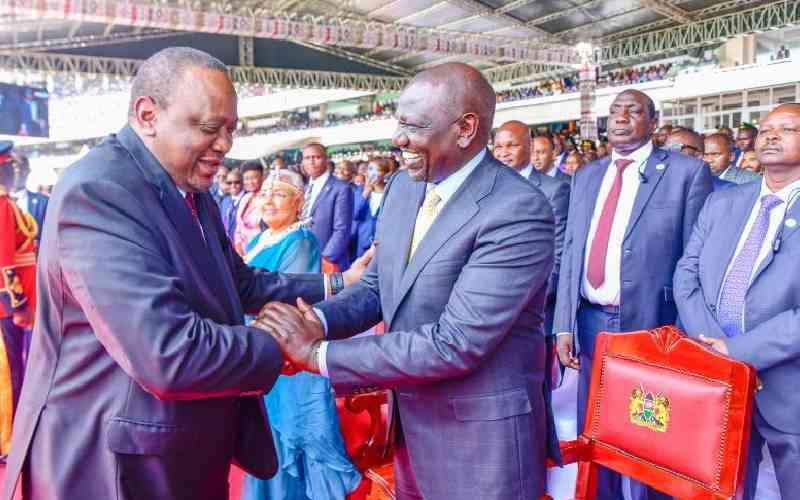Kenya’s top spy Michael Gichangi resigned last night as President Uhuru Kenyatta made major changes to his Government’s security and ambassadorial dockets.
The purge in the security docket was the most glaring and the official explanation given by State House for the resignation of Kenya’s long-serving head of the National Intelligence Service (NIS) was that he quit for “personal reasons”.
It comes on the back of lapses by Kenya’s security agencies in the Coast region, including the terrorist attack on Westgate in Nairobi in September last year, and the recent attacks in Lamu where over 1000 were killed by militants linked to Al-Shabaab.
The late night changes, more typical of the old Kanu era than Jubilee’s self-declared “digital” Government, were announced at 9.30pm when most Kenyans were asleep, but State House gave no reasons for the delay.
Elderly election losers who backed President Uhuru last year were the winners. Gichangi headed the NIS for nine years. However, he will stay on until the President appoints a successor. They come just a month to the first anniversary of the attack on Nairobi’s Westgate shopping Mall in which 71 people were killed and over 230 injured.
“He has played his role as Director-General of NIS with commitment, dedication and professionalism, for which our country is grateful,” noted the State House dispatch announcing the changes. In a brief to newsrooms late last night, President Kenyatta moved Interior Principal Secretary Mutea Iringo to the Ministry of Defence, and brought Defence PS Monica Juma to the Ministry of Interior. He also shifted Immigration boss Jane Waikenda and made her Kenya’s deputy ambassador to Pretoria.
Gichangi, Iringo, Juma and Waikenda all come from dockets that took a lot of heat at the runaway insecurity and the rise in terrorism cases from the Al-Shabaab militia, which Kenya’s military in Somalia has been fighting since October 2011.
Al-Shabaab has also been straying into Kenya and carrying out attacks. The gaps in the quality of formed the cocktail that allowed terrorists to sneak into the country’s capital and hold the nation hostage for four days last September. Robinson Githae, the man who succeeded Kenyatta at the National Treasury in 2011, will be Kenya’s top diplomat at Washington DC. Jean Kamau, who was acting ambassador in Washington DC, has been moved to Bangkok.
The changes come within the week that the President returned from a week-long trip to the United States.
Chirau Ali Mwakwere, a former minister of Transport has been made Kenya’s ambassador to Dar es Salaam. Kiema Kilonzo, the former MP for Mutito, also got rewarded as Kenya’s envoy to Turkey. Former Education Minister Prof Sam Ongeri, has been appointed envoy to the UN Habitat.
Sheikh Mohammed Dor, a former nominated MP, was also given a job in Muscat, Oman, as the ambassador.
Major-General Jeoff Otieno, who retired late last month from the military will be Kenya’s contact with the government of General Abdel Fattah el Sisi in Cairo Egypt.
A Dr Karau has been appointed to be the ambassador in Geneva, while former Maendeleo ya Wanawake boss Rukia Sugow is the ambassador in Tehran.President Kenyatta said the changes were made to “enhance service delivery” in the Jubilee administration at a time when it is battling insecurity, poor performance in sports and staring at a potential crisis of an Ebola outbreak.
Other changes made to the Principal Secretaries are Patrick Omutia moved to the Ministry of Mining from the Ministry of Sports and Culture; and Richard Ekai moved to the Ministry of Mining from the Ministry of Sports.
Mwanamaka Amani Mabruki replaces John Konchella at the Ministry of Devolution, while Konchella takes her place at the Ministry of East Africa Cooperation.
Fred Sigor was also moved out of the health docket to the Ministry of Livestock, while Dr Khadija Kassachoon left the Ministry of Livestock for the Ministry of Health.
Stay informed. Subscribe to our newsletter
 The Standard Group Plc is a
multi-media organization with investments in media platforms spanning newspaper
print operations, television, radio broadcasting, digital and online services. The
Standard Group is recognized as a leading multi-media house in Kenya with a key
influence in matters of national and international interest.
The Standard Group Plc is a
multi-media organization with investments in media platforms spanning newspaper
print operations, television, radio broadcasting, digital and online services. The
Standard Group is recognized as a leading multi-media house in Kenya with a key
influence in matters of national and international interest.
 The Standard Group Plc is a
multi-media organization with investments in media platforms spanning newspaper
print operations, television, radio broadcasting, digital and online services. The
Standard Group is recognized as a leading multi-media house in Kenya with a key
influence in matters of national and international interest.
The Standard Group Plc is a
multi-media organization with investments in media platforms spanning newspaper
print operations, television, radio broadcasting, digital and online services. The
Standard Group is recognized as a leading multi-media house in Kenya with a key
influence in matters of national and international interest.







